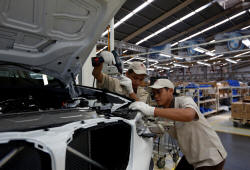European automakers BMW, Volvo to trial new LME steel
contracts
 Send a link to a friend
Send a link to a friend
 [November 06, 2018]
By Maytaal Angel and Pratima Desai [November 06, 2018]
By Maytaal Angel and Pratima Desai
LONDON (Reuters) - European automakers BMW
and Volvo plan to experiment with steel contracts to be launched by the
London Metal Exchange early next year, a move which could eventually
change the way the industry hedges and prices contracts, industry
sources said.
The LME is launching three hot rolled coil (HRC) steel futures covering
Europe, North America and China early next year, and industry sources
told Reuters automakers such as Volvo and BMW <BMWG.DE> were interested
in using them.
Hot rolled coil (HRC) is a flat steel used to make cars and white goods
and typically bought by consumers on annual fixed price contracts. The
LME's cash-settled contract will be settled against an industry
benchmark.

"During the first six months, merchants and traders will put volumes in
to get liquidity going," a broking source said. "If that works,
manufacturing companies including BMW and Volvo will ask suppliers to
make offers on the basis of LME prices for new, small contracts, see how
it works."
One source said BMW already uses iron ore derivatives as a proxy for
hedging some of its steel costs, so could move with relative ease to
trading the new LME contracts.
BMW said it is currently pursuing a "hedging strategy" and aims to
"increase planning reliability for the company".
Volvo said: "We continuously review our raw material strategies however
no decisions have been taken on hedging."
Automakers, alongside construction firms, banks, brokers, merchants and
steel service centers, have traditionally been open to steel futures,
while steelmakers have mostly been opposed, concerned about potential
loss of pricing power.
[to top of second column] |

Workers assemble a new BMW X3 vehicle for local distribution at a
Gaya Motor assembly plant, part of Astra International, in Jakarta,
Indonesia, July 18, 2018. REUTERS/Willy Kurniawan/File Photo

Industry sources say automaker interest bodes well for the contracts, but they
also stressed that new contracts usually take years to gain traction, adding
that a lack of interest from steelmakers could slow the process.
"From what I've seen, first merchants get involved, then prop traders, then
service centers or stockists. Eventually mills start offering steel on an index
(linked price)," said a source at an LME brokerage.
Sources involved in broking and looking at providing liquidity for the new
contracts say they are talking to leading steelmakers about using the new
contracts.
The LME already has contracts for steel scrap <SSCc3> and for steel rebar
<SRRc2>, a type of construction steel. Volumes have been growing modestly since
the contracts' 2015 launch.
Some 4.2 million tonnes of scrap and 500,000 tonnes of rebar have been traded on
the LME in the year to date, versus 3 million tonnes of scrap and 644,000 tonnes
of rebar traded last year, according to Refinitiv Eikon data.
The LME, the world's oldest and largest metals marketplace, is owned by Hong
Kong Exchanges and Clearing Ltd <0388.HK>.
Having lost some market share in recent years to the CME Group <CME.O> and
Chinese Shanghai Futures Exchange (ShFE), it is aiming to make inroads into
steel, a global industry worth an annual $900 billion.
(Additional reporting by Edward Taylor and Esha Vaish; Editing by Veronica Brown
and David Evans)
[© 2018 Thomson Reuters. All rights
reserved.] Copyright 2018 Reuters. All rights reserved. This material may not be published,
broadcast, rewritten or redistributed.
Thompson Reuters is solely responsible for this content.
 |